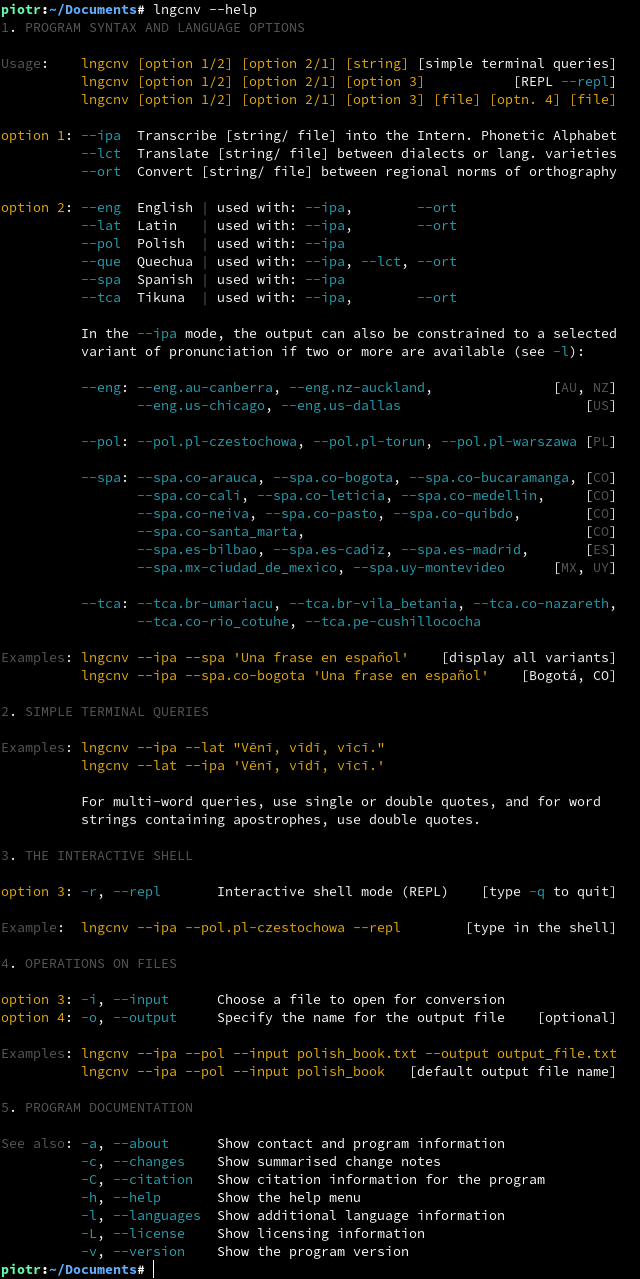
'lngcnv' may stand for 'language converter', 'linguistic converter', 'lenguaje convertido', and the like.
lngcnv allows (1) displaying pronunciation of a phrase in the International Phonetic Alphabet (IPA), (2) translating between different (e.g., dialectal) varieties of a language, and (3) converting between different (e.g., regional) norms of orthography when a word or some piece of text is provided either (a) as an argument directly from the command line or (b) in a file, such as a hundreds of pages long book.
Multiple modern and ancient languages are supported, often including several dialects. The program's source code and all linguistic algorithms are created entirely from scratch, and distributed under the MIT license. lngcnv is written in Rust for high performance, code correctness, and ease of long-term development.
Use Charis SIL, Doulos SIL, or Gentium Plus font for good rendering of characters of the International Phonetic Alphabet.
1. English: pronunciation & orthography
– Pronunciation of Australian English [experimental, still in alpha stage]
– Transcribe into American English
2. Latin: pronunciation & orthography
– Reconstructed pronunciation of Classical Latin
– Transcribe into the ancient orthographic convention (before the 2nd c. AD)
3. Polish: pronunciation
– Pronunciation of the Polish Language (Częstochowa)
4. Quechua: pronunciation & dialect translation & orthography
– Pronunciation of Chanka/ Ayacucho Quechua (Wanta)
– Translate into Ayacucho Quechua from other varieties of Southern Quechua
– Transcribe between the trivocalic and the pentavocalic orthographies
5. Spanish: eight variants of pronunciation
– Pronunciation of Bolivian Spanish (Santa Cruz de la Sierra)
– Pronunciation of Colombian Spanish (Bogotá; Leticia; Medellín; Santa Marta)
– Pronunciation of Mexican Spanish (Ciudad de México)
– Pronunciation of Spanish of Spain (Cádiz; Madrid)
[Some pronunciation variants may be not yet implemented during the alpha phase but all are planned for the release 1.6.0.]
6. Tikuna/ Ticuna: pronunciation & orthography
– Five variants of pronunciation (Río Cotuhé, CO; Cushillococha, PE; Nazareth, CO; Umariaçu, BR; Vila Betânia, BR)
– Four distinct orthographies (Brazil; Colombia; Peru–ILV; Peru–FORMABIAP)
[Static link to a changeable image of the most recent version of lngcnv! This may include pre-releases!]

lngcnv should run smoothly on Windows and macOS. Yet, it is being developed and tested on Linux.
1. Install from crates.io by the use of cargo:
cargo install lngcnv --version 1.6.0-alpha.1
By default, the file will be downloaded to .cargo/bin/, a hidden folder in your home directory.
2a. For convenience, you will probably want to copy lngcnv to /usr/bin/ as in Method 2 (3a, 3b).
2b. Alternatively, add ~/.cargo/bin directory to your PATH variable (see documentation of your shell).
1. Download the binary 'lngcnv' for Linux x86_64 from GitHub:
https://github.com/piotrbajdek/lngcnv/releases/tag/v1.6.0-alpha.1
2. Make the file executable:
sudo chmod +x ./lngcnv
3a. Install lngcnv via copying the binary to /usr/bin/
sudo cp lngcnv /usr/bin/
3b. On Fedora Silverblue / Kinoite:
sudo cp lngcnv /var/usrlocal/bin/
Download the lngcnv source from GitHub. Then, build and install the program:
https://github.com/piotrbajdek/lngcnv/releases/tag/v1.6.0-alpha.1
cargo build && sudo cp target/debug/lngcnv /usr/bin/
[Static links to changeable images of the most recent version of lngcnv! This may include pre-releases!]


Get engaged in discussions and share your ideas! Here, you'll find development plans and relevant announcements:
https://github.com/piotrbajdek/lngcnv/discussions
Strictly technical issues can be opened and tracked here:
https://github.com/piotrbajdek/lngcnv/issues
The Rust community’s crate registry
https://crates.io/crates/lngcnv